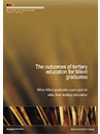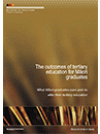This report looks at the earnings and outcomes for young Māori and non-Māori who complete a qualification in the New Zealand tertiary education system. It replicates the methodology of Moving on up – what young people earn after their tertiary education (Mahoney et al, 2013) to examine differences in incomes and employment rates for different types of qualifications by ethnic group.
Key Results
- The earnings premium for Māori who completed tertiary qualifications was greater than for non-Māori. This suggests that tertiary education qualifications tend to reduce the disparities between the earnings of Māori and non-Māori.
- Māori and non-Māori graduates’ earnings were similar in the first couple of years after study, but widened in intervening years. By year five, Māori graduates at most qualification levels were earning less than non-Māori. The exception was at the doctorate level. Māori doctorate graduates earned more than non-Māori graduates five years after study.
- Earnings were closest, both immediately and five years after study, for bachelors and other level 7 qualifications.
- Māori graduates earned more than non-Māori graduates in certain fields. Bachelors degree narrow fields in which Māori graduates earned more after five years included graphic and design studies.
- The first year out of study, destinations were similar between Māori and non-Māori with a few exceptions. Employment rates were reasonably similar between ethnic groups after completing qualifications at higher levels, but Māori were less likely to be in employment than non-Māori after completing qualifications at lower levels. However, Māori were more likely than non-Māori to be on a benefit after completing lower level qualifications such as a level 1 to 4 certificate.
- Māori bachelors degree graduates were more likely to be in employment five years after study in the following narrow fields: economics and econometrics, chemical sciences, earth sciences, rehabilitation therapies, philosophy and religious studies and nursing.
- Māori graduates were less likely to be overseas than non-Māori after completing qualifications at diploma level or above, but there was no real difference below this level.


